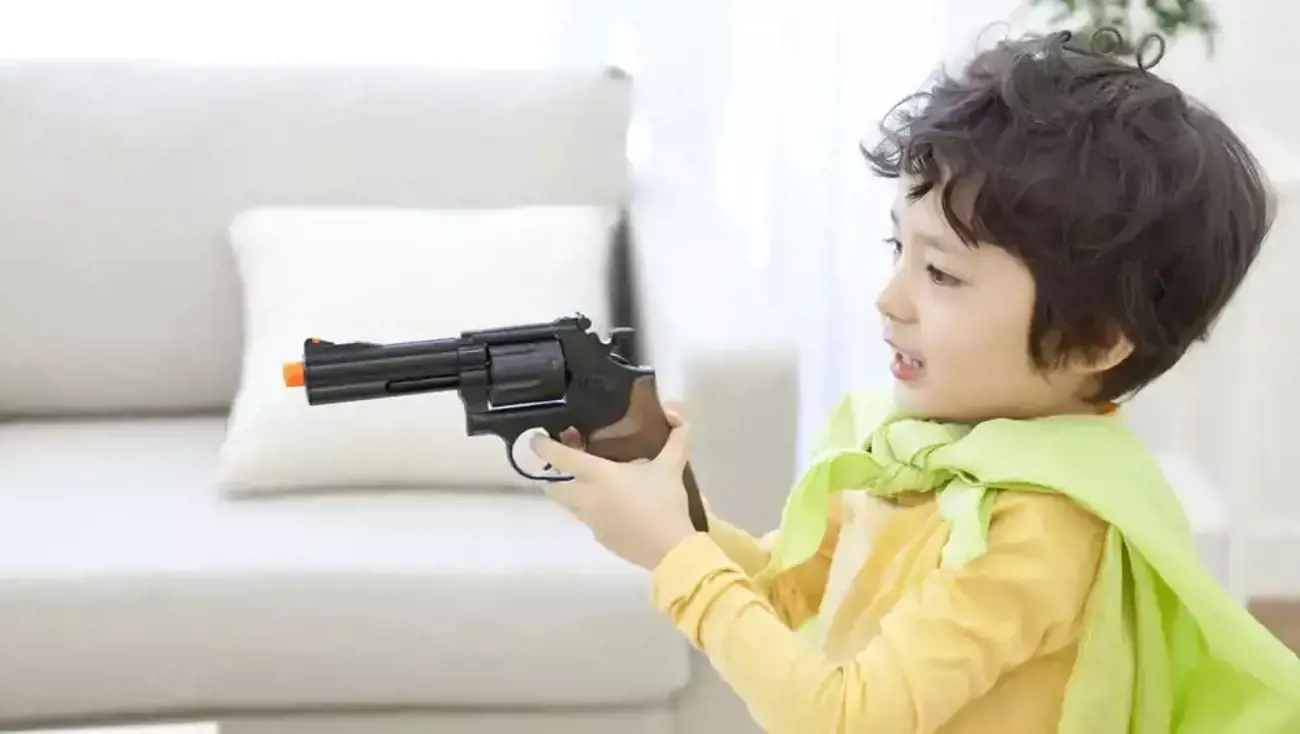Dramatic play is an important part of childhood, and although this can include a preschooler serving up play dough cookies at their cardboard box 'bakery', it might also involve them brandishing a toy gun or engaging in other weapon play.
Australian families are generally cautious about real guns and this begs the question – are toy shooters a cause for concern?
Here we look at recent news around this and think about the possible benefits of weapon play.
Why has gun play hit the headlines this year?
There is nothing new about gun play, but in recent months this topic has been in the news, with opinion divided between those 'for' and 'against' this kind of pretend play.
In the UK, the Royal Family attracted criticism when four-year-old Prince George was photographed playing with a plastic pistol. While a child care survey found that 79 per cent of UK nurseries no longer allow toy weapons, driven by concerns that toy guns and swords 'encourage aggression and create a noisy, chaotic environment'.
Then, closer to home, it was claimed that the Australian Childcare Alliance (ACA) NSW was proposing to ban toy guns here as well.
Is weapon play being banned in NSW child care centres?
It appears not. ACA NSW Chief Executive, Chiang Lim told Now to Love that, 'There is no blanket ban. What individual centres do [about gun play] is completely up to them … They have to do what is best for them, for the families that use their service and for their local communities.'
However, although she says, 'Gun play doesn't really come into the equation that much,' the ACA NSW is surveying child care services and families to get their input about weapon play and intends to redistribute those ideas as a helpful resource.
With that in mind, what do other parenting experts think about gun play?
Although mums and dads might feel uncomfortable about young children toting toy guns, others are more positive about this kind of dramatic play.
Speaking to The Independent, parenting expert Sarah Ockwell-Smith said, 'I understand why gun play worries parents, however, research shows that any aggression demonstrated while engaging in 'war play' is not carried over into real life.
Pretend play is an important way for children to make sense of the world, in an age where guns are becoming more prevalent, gun play helps them to process what they may see on the news … in a safe way.
That said, even if parents restrict gun-toys, it is incredibly likely that children will fashion their own, from a stick, for instance. For this reason, combined with the evidence, I see no issue with letting children play with guns.'
For her part, child psychologist, Dr Sasha Lynn prioritises common sense, explaining that, 'There has to be healthy discussion around gun play and differentiating between pretend play and the reality of it all.'
This is a sentiment that's echoed in New Zealand, where My Early Childhood Education (My ECE) says, 'Even children as young as two years can distinguish between what is real and what is make believe … It is not necessary to stop a child's play when a child knows that what they are doing is playing; it's not a real situation and no-one is actually getting hurt.'
What are some possible benefits of weapon play?
According to My ECE, weapon play can benefit children by:
- Exercising their imagination
- Honing their problem-solving skills
- Empowering them to take the initiative and make decisions
- Teaching empathy
- Teaching them about consent and safety when playing games, e.g. only 'shooting' others who agree to play the game
- Allowing them to share interests and build friendships
- Developing confidence
- Developing play acting and language skills
- Teaching them limits, e.g. if they're too rough, then the game will stop
- Teaching them how to cooperate
Saying that, My ECE says many early childhood education professionals in New Zealand warn against giving children authentic-looking replica weapons because this blur the line between what is real and what is imaginary.
Instead of a toy gun, children might play with:
- Foam pool noodles
- Rolled up newspapers
- Wooden blocks
- Pegs
- Small sticks
- Or simply hold up their fingers as a 'gun'
Weapon play won't necessarily interest your child – just as they may not be keen to serve up play dough cookies. Be guided by your child's interests, your family's feelings on the issue, and always communicate openly with your child and your early childhood education and care service.


































